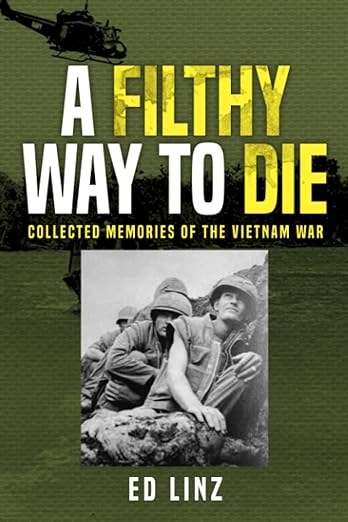By Ed Linz
Exchange Publishing (2023)
History has not been supportive of either the origins or the rationale of American involvement in the Vietnam War nor of its legacy a half-century later. Author Ed Linz takes the reader back to what is fast becoming a distant, perhaps forgotten era.
The wartime lives and experiences of the men that Ed Linz chronicles will provide the reader with a close-up view of what a war looks like and its impact on people, the world, and our own nation. Those individual experiences provided the background as Linz developed his analysis and provided his overview of the Vietnam War. He reveals the mistakes and failures of six presidents as they led the nation down a path of error-prone diplomacy and wartime policy.
Linz plumbed the depths of the combat action of more than sixty of his U.S. Naval Academy 1965 classmates, following these war fighters as Marines, aviators, and commanders of combat vessels on the rivers, and off the shores of Vietnam. Ed Linz describes how his classmates evolved to confront unanticipated challenges in war and in life.
To construct this historical narrative Linz conducted frank, personal interviews consuming as much as four hours each. Reflections of the combatants were memories from 55 years in the past as they recalled unfiltered, honest commentary. The author conveys the story in a folksy manner and shows their life-changing experiences, for clearly this book is a portrait of a segment of America’s youth at war.
The reader will come to understand how these men lived a year or even as much as two or three years of their lives in a war that was misapplied 20 years before they arrived, É and a war that would progress for 30 years until its inglorious end.
Author Linz drew from the combatants’ information to explain his Vietnam War premise that it was “a filthy way to die.” The book offers a fresh upfront view of the war in its full reality. Throughout the book Linz adroitly interspersed his own detailed explanations that expanded and clarified what each of his classmates described in their interviews. That technique reveals author Linz’s gift for storytelling as also witnessed in his earlier ethnographic study, They Never Threw Anything Away, Memories of the Great Depression by Americans Who Lived It.”
In this account of the Vietnam War, Linz departed from the mold of an Ernest Hemingway who saw and related glory in the horrors and tragedies of war. Linz sees beyond that perspective to a deeper understanding of any war’s historical context, wherein the majority of people killed in most of the deadliest wars of all time are innocent civilians.
As the readers progress through this book, they will become familiar with the term ‘fog of war’, and understand the folly and mistakes made both in Vietnam and in Washington, D.C. They will come to understand how important it is that our future leaders heed history.
— Phil Ferrara

Let's keep in touch!
Keep up with the latest OutLook by the Bay information by signing up here. We promise not to waste your time.


